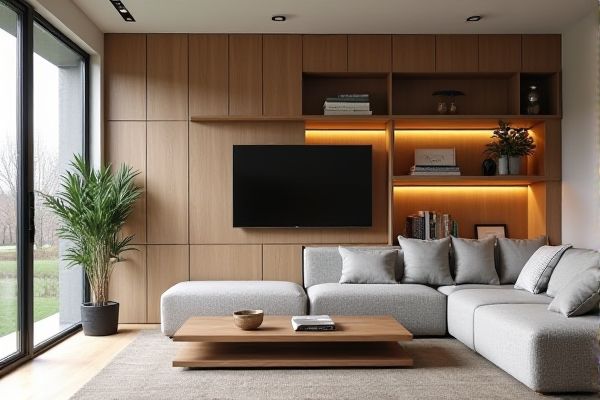
Modular storage offers customizable, flexible solutions tailored to your evolving space and organizational needs, while fixed storage provides a permanent, often more durable setup optimized for consistent layouts. Discover which storage option best fits your lifestyle by exploring the advantages and limitations detailed in the rest of the article.
Table of Comparison
| Feature | Modular Storage | Fixed Storage |
|---|---|---|
| Flexibility | Highly customizable and expandable | Predefined size and configuration |
| Installation | Easy to install and reconfigure | Permanent and requires professional installation |
| Cost | Cost-effective for evolving needs | Higher upfront investment |
| Durability | Moderate, depends on materials | Typically more durable and sturdy |
| Space Efficiency | Optimized by adjustable modules | Fixed layout may limit optimization |
| Usage | Ideal for dynamic storage needs | Suitable for permanent storage solutions |
Introduction to Modular and Fixed Storage
Modular storage systems offer customizable configurations that adapt to varying space requirements, enhancing organization and maximizing efficiency. Fixed storage solutions feature predetermined dimensions and layouts, providing stability and simplicity but limited flexibility. Choosing between modular and fixed storage depends on specific needs for adaptability versus consistency in storage design.
Key Differences Between Modular and Fixed Storage
Modular storage systems offer flexibility with customizable components that can be reconfigured or expanded to fit changing space requirements, unlike fixed storage which is designed with a permanent structure and specific dimensions. Fixed storage solutions provide stability and durability, often at a lower initial cost, but lack the adaptability of modular units to accommodate varying storage needs. The key differences lie in modular storage's scalability and versatility versus the rigid, non-adjustable nature of fixed storage installations.
Flexibility and Scalability Comparison
Modular storage systems offer superior flexibility by allowing users to customize configurations and easily reconfigure components to adapt to changing needs. Fixed storage solutions, while often more stable, lack scalability and are limited to their initial design, making them less adaptable to evolving storage requirements. The scalability of modular storage supports incremental expansion without significant overhaul, providing a cost-effective approach for dynamic environments.
Installation Process: Modular vs Fixed Solutions
Modular storage systems offer a flexible installation process with components that can be easily assembled, adjusted, or expanded without professional help, making them ideal for dynamic or evolving spaces. Fixed storage solutions require precise measurements and often professional installation, as they involve permanently attached units customized to fit specific dimensions. The modular approach reduces installation time and complexity, while fixed storage provides a stable, integrated design tailored to exact room layouts.
Space Optimization and Efficiency
Modular storage systems maximize space optimization by allowing customizable configurations tailored to specific needs, enabling efficient use of awkward or limited areas. Fixed storage units offer predetermined dimensions and layouts, which may lead to underutilized space and reduced flexibility. Businesses seeking to enhance storage efficiency often prefer modular solutions for their adaptability and scalability.
Cost Analysis: Upfront and Long-Term
Modular storage systems often present a lower upfront cost due to their scalable components, allowing businesses to invest incrementally as needs grow. Fixed storage solutions typically require a higher initial investment but can offer cost savings over time through durability and reduced need for reconfiguration. Long-term expenses for modular storage include potential maintenance and part replacements, while fixed storage may incur higher renovation costs if changes are needed.
Maintenance and Upgradability
Modular storage systems offer superior upgradability by allowing individual components to be replaced or expanded without affecting the entire setup, reducing downtime and long-term maintenance costs. Fixed storage solutions often require complete system replacements or complex modifications for upgrades, resulting in higher maintenance expenses and less flexibility. Regular maintenance for modular storage is simplified due to easily accessible parts, while fixed storage may demand extensive labor and technical expertise for troubleshooting and repairs.
Aesthetic and Design Versatility
Modular storage offers superior aesthetic and design versatility compared to fixed storage by allowing you to customize and reconfigure units to fit changing spaces and styles. Fixed storage typically features a uniform design that limits personalization and adaptability, restricting creativity in room layout. Choosing modular solutions enables seamless integration with your existing decor while evolving with your preferences.
Ideal Use Cases for Each Storage Type
Modular storage is ideal for dynamic environments like small offices or growing households where flexibility and customization are essential for adapting to changing needs. Fixed storage suits spaces with consistent storage requirements such as built-in closets or cabinetry in kitchens, offering durability and efficient use of space. Your choice depends on whether you prioritize adaptability or permanence in organizing your belongings.
Conclusion: Choosing the Right Storage Solution
Modular storage offers flexibility and scalability, allowing customization to fit evolving spaces and needs, while fixed storage provides a robust, permanent solution with predictable dimensions and structure. Selecting the right storage solution depends on factors such as space constraints, budget, long-term usage, and adaptability requirements. Evaluating these criteria enables informed decisions that balance functionality, aesthetics, and cost-efficiency tailored to specific storage demands.
 homyna.com
homyna.com